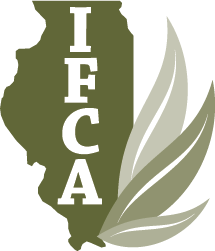IFCA Suggestions to USEPA on Dicamba Use on Soybean
The IFCA Board and staff has been very engaged all year on the dicamba issue. We talk with the IDA every week regarding the misuse complaints and the IDA investigations, and we recently met with all the pesticide manufacturers to discuss the best path forward given the high number of complaints that farmers have filed with the IDA, the clear majority of which are dicamba symptoms on sensitive soybeans.
As of today, IDA has received 319 misuse complaints attributed to dicamba symptoms and the total number of pesticide misuse complaints is now at 500---a historic high and something that demands attention and leadership from the pesticide industry. Historically, total complaints to IDA have averaged 100-125 for nearly two decades (including the years when the RR soybean technology was introduced in the mid 1990's). A 400% increase in pesticide complaints is not a good thing for our industry no matter how you try to look at it. And when most of the complaints are coming from farmers, it is even more concerning.
After evaluating the results of the dicamba survey of our retail members and meeting with the registrants and IDA last week, IFCA submitted suggestions to USEPA to consider incorporating into future dicamba labels. Let us be clear: IFCA supports the use of dicamba as a weed management tool in soybean. We also support co-existence with other sensitive soybeans, specialty crops and other sensitive plants.
The make-up of our mostly urban legislature and the populous nature of our state demands we be proactive for the pesticide application industry to succeed. This issue extends far beyond just dicamba use. We must reduce off-target issues working with all involved: the IFCA members, soybean and specialty growers, homeowners, the IDA and environmental groups, all of who have an interest in this issue. Stewardship is a fundamental part of IFCA's mission and it is our goal to provide leadership and reasonable approaches to address issues of concern, and establish a successful path forward for judicious pesticide use in Illinois, in the short and long-term. There will always be production of sensitive soybeans, specialty crops and other plants that are sensitive to dicamba even as more Xtend acres are planted.
In our letter to USEPA, IFCA is on record supporting the use of dicamba in soybean, and we made four suggestions for them to consider based upon the input of our commercial applicator members from the survey. We looked at the factors that made for a successful experience with dicamba use and kept in mind factors that could help ensure co-existence with sensitive soybean and provide more clarity in terms of timing of applications.
1. Growers should provide to the applicator the type of soybean trait planted on all sides of any Xtend field that is intended to be treated with dicamba, in a form signed by the grower and provided to the applicator, ahead of any commercial application.
2. "Do not apply if sensitive crops are adjacent to the field of application in any direction."
3. Do not apply beyond the V6 growth stage.
4. Do not apply after June 30 of each calendar year.
We understand that these suggestions will be viewed in many ways: as reasonable, as going too far, or not going far enough. IFCA sought to balance the need for this technology with the obvious issues that have occurred with use near sensitive soybean. There is substantial responsibility and liability on the commercial applicators who perform 70% of all applications, and we attempt to clarify areas of the label to help applicators feel more confident in deciding to apply or not to apply knowing the proximity of sensitive soybeans. Finally, the late application of dicamba to soybeans farther along in growth stage, and during peak summer weather conditions, has been something many states are seeking to address. With proper planning ahead of the 2019 season and with grower cooperation to help protect sensitive soybeans, we can achieve an improved experience in 2019.
There are reasonable options for co-existence near non-DT soybeans and for weed management in double crop soybeans. With all that is at stake, we are looking for give and take to ensure the future of this technology. If we lose the dicamba labels altogether by not addressing the obvious issues, then we could face a future where most GMO soybeans planted are dicamba tolerant, but with no legal way to apply dicamba post-emergence. That is a possibility we must all work to avoid.
Keep in mind that while USEPA will determine what is on the federal pesticide label, the states can also enact additional restrictions and that too could happen in Illinois, especially if the legislature gets involved. It only takes one legislator to introduce a bill in order to get the debate going at our state capitol; the divisiness in the ag industry along with the concern of the environmental groups will make for challenges at the state capitol if we are not proactive well ahead of the 2019 season.
You can see the letter that IFCA sent to USEPA which explains in detail the reasons for the four suggestions: click here. If you have questions or concerns, please contact Jean Payne or KJ Johnson at IFCA. While there is no formal comment period for the re-registration process on dicamba, IFCA has a very good relationship with USEPA and we provided our comments to them hoping that a proactive organization like IFCA could provide helpful input into this very difficult label consideration process.
